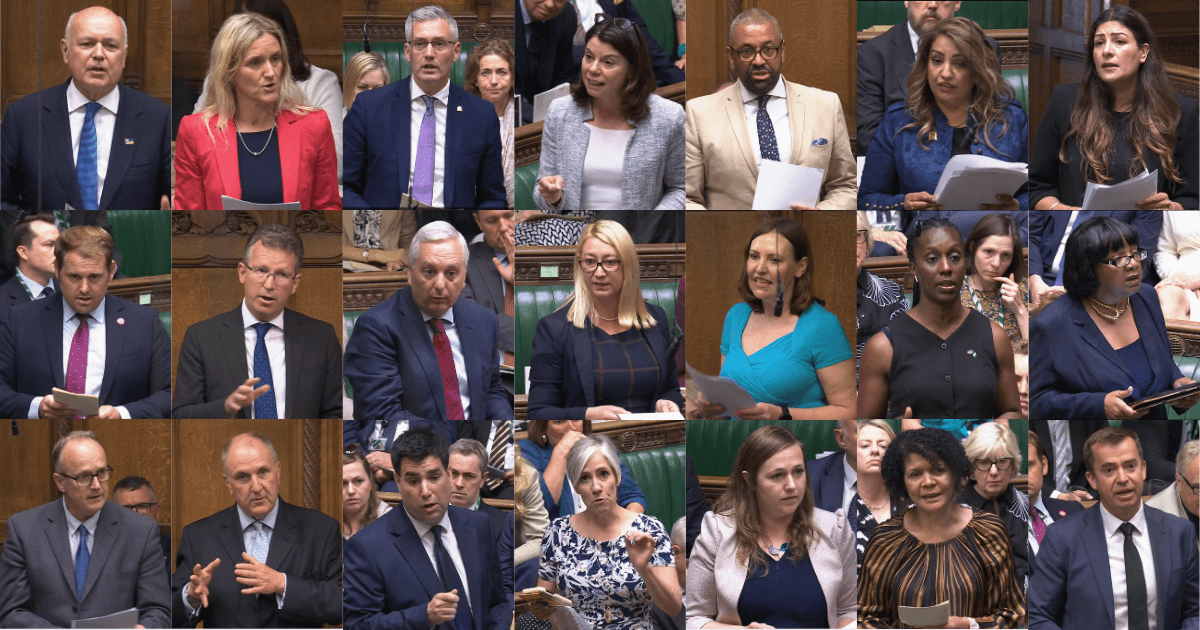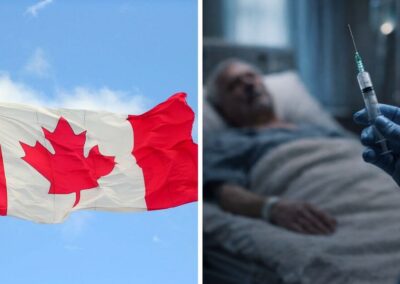Last Friday, MPs voted by 314 to 291 in favour of the Terminally Ill Adults (End of Life) Bill at Third Reading, amidst growing cross-party concern about the risks the Bill poses to vulnerable people.
This marks a significant drop in support for the Bill, which passed its Second Reading in November with a majority of 55 votes. By contrast, Friday’s Third Reading saw the margin shrink to just 23 votes, with a number of MPs who previously supported the Bill now voting against or abstaining.
Had an additional 12 MPs moved from supporting the Bill to opposing it at Third Reading, the Bill would have been defeated.
The Bill leaves the Commons lacking a majority, with fewer than half of all MPs voting for it at its final stage.
The Bill now faces an uphill battle to reach Royal Assent, with campaigners confident that it can be overturned given its continued loss of support.
The Bill had its First Reading in the House of Lords today and now awaits a date for its Second Reading debate.
Rushed process and legislative uncertainty
A number of MPs raised serious concerns about the rushed nature of the debate and the Bill’s continued lack of clarity, despite seven months of scrutiny since Second Reading. The sponsor of the Bill, Kim Leadbeater MP, claimed that the new criminal offences introduced by the Bill meant that it provided a robust process that went “further than any other piece of legislation in the world”.
However, Sir Iain Duncan Smith MP urged MPs not to rely on the House of Lords to fix the assisted suicide Bill saying, “we were told on Second Reading that the safeguards and protections we were sending to Committee would somehow become the most robust and strongest in the world”.
“In fact, in Committee they got weakened, not strengthened, and that is the problem in all this”.
David Smith MP highlighted that the Bill still fails to define key legal terms such as coercion, dishonesty, or pressure, despite these being central to the law’s operation. “[T]he Bill still does not even define ‘dishonesty’, ‘coercion’ or ‘pressure’. Let me say that clearly again—it does not define “coercion”. If we, as legislators, cannot do that, then who will?” he asked. He also warned that too many concerns remain half-answered or unresolved, saying “these things [concerns] have not been put right”.
Objections to the legislative workability were also raised by Sarah Olney MP, who warned that the Bill is so vague and legally unstable it would likely result in legal challenges, “endless” attempts to amend it and difficulty of implementation, ultimately eroding public trust.
Key safeguards rejected
Before moving on to Third Reading, the debate last Friday began with the conclusion of Report Stage in the form of votes on key safeguards. Despite repeated warnings from MPs and campaigners, further amendments were rejected that would have closed dangerous loopholes and introduced meaningful oversight into the assisted suicide process. Notably, New Clause 16 would have made it explicit that a person is not eligible for assisted suicide if substantially motivated by feeling a burden, a disability or depression. Also rejected was amendment 24, tabled by Daniel Francis MP, that would have protected vulnerable people by ensuring the burden of proof would be to establish mental capacity rather than presuming it by default.
James Cleverly MP reminded the House that MPs had been “promised the gold standard” in terms of safeguards, yet many of these failed to survive the Committee Stage. We can’t “just vote in accordance with the broad principles”, he urged, “we need to think about the detail of the Bill”.
Several MPs raised specific examples of where the Bill still falls short. Naz Shah MP pointed to international cases where at least 60 women with anorexia have died by assisted suicide, not because they were terminally ill, but because they weren’t given proper treatment. She warned that the amended Bill still does not “close the [anorexia] loophole”.
Preet Gill MP echoed this, noting that the definition of terminal illness remains dangerously vague, and could allow those with severe eating disorders to qualify once their health deteriorates.
“The very definition of “terminal illness” has proved to be seriously flawed, because it would allow people with anorexia to qualify once their physical condition deteriorates”.
Jen Craft MP drew attention to the weaknesses in the panel system, which would oversee approvals. “[T]hose panels may in exceptional circumstances—the Bill does not set out what those are—opt not to even meet the person whom they are discussing”.
Meanwhile, in one of the most telling moments of the debate, pro-assisted suicide MP Luke Taylor stated that rejecting the Bill, “imperfect as it may be”, would prolong suffering, indicating his support for the Bill despite acknowledging its flaws.
Vulnerable people at risk
Several MPs also mentioned the risk that vulnerable people will face if the assisted suicide Bill is passed into law. Jeremy Wright MP warned against sending a message that some lives are no longer worth living.
“I do not want to live in a society in which anyone, including the terminally ill, is encouraged in the belief that their life is not valuable and valued to their very last moment”.
Daniel Francis MP highlighted the risk that individuals who feel like a burden to their families or believe that their death could relieve financial strain would feel pushed toward assisted suicide. He was met with the reply from Josh Babarinde MP that “[s]elf-coercion is a choice”, prompting concern from campaigners who see such language as a dismissal of the real pressures people face.
Jess Asato MP shared a striking quote from a prominent supporter of assisted suicide: “Even if a few grannies get bullied into it, isn’t that a price worth paying for all the people who could die with dignity?” She made clear that this cannot be an acceptable price in a compassionate society. She added that her opposition to the Bill stems from her reasons for entering public life: to protect the vulnerable, fight for equality, and challenge individualistic notions of choice that ignore the impact on others.
Disabled and marginalised voices ignored
Concerns raised by disabled people and their representative organisations featured prominently in the Third Reading debate. Vicky Foxcroft MP, who previously supported assisted suicide in 2015, explained that she had changed her position after serving as Shadow Minister for Disabled People. She noted that “the vast majority of disabled people and their organisations oppose [assisted suicide]” and expressed shock that only one disabled organisation had been given the opportunity to provide oral evidence at Committee Stage, revealing how excluded vulnerable individuals and those representing them had been from the legislative process.
Florence Eshalomi MP also raised the concerns of minority communities, questioning how it could be right to consider legalising assisted suicide when some communities still lack access to basic healthcare and palliative care. She highlighted that many already mistrust the medical system, and that their voices have been largely absent from the debate, saying “[H]ow is it right that some communities are denied basic healthcare within the current system; how is it right that some communities do not have access to good palliative care; how is it right that some communities still mistrust the medical profession; and how is it right that we are not listening to their voices?”
Naz Shah MP and Diane Abbott MP warned that under the current proposals of the Bill, lives could be ended unnecessarily. Naz Shah MP challenged MPs, asking “what is the margin of error that we are willing to risk today when it comes to something as serious as death?”.
Diane Abbott MP reiterated the same concern, saying “What could be more unjust than someone losing their life because of poorly drafted legislation?”, later adding “I would not put my life, or the life of anyone dear to me, in the hands of a panel of officials”.
Leading medical bodies and experts oppose the Bill
Throughout the debate, MPs pointed to the overwhelming lack of support for the Bill from across the medical community. James Cleverly MP noted that even professional bodies named in the legislation have said they do not have the capacity to staff the decision-making panels the Bill would require.
Calum Miller MP and Dr Neil Hudson MP both drew attention to the near-unanimous opposition from palliative care specialists. Miller highlighted that top palliative care experts oppose the Bill and warned that hospices remain severely underfunded, making it impossible to offer patients a meaningful choice at the end of life. Hudson echoed this, urging MPs to prioritise improving access to care rather than introducing assisted suicide.
Both Richard Burgon MP and Simon Hoare MP expressed concerns about the growing number of expert bodies calling for the legislation to be rejected.
Richard Burgon MP highlighted that “…the vast majority of primary care doctors, geriatricians and groups representing people with disabilities, eating disorders and domestic violence are all opposed not to the principle but to this Bill specifically”.
“Some people who are supportive of the principle of assisted dying do not support this specific Bill; can my hon. Friend explain their opposition?”, he continued.
Simon Hoare MP pressed the Bill’s sponsor directly, asking how concerned she was about this, but Kim Leadbeater MP dismissed the concerns as merely “different views”, a response that drew criticism online from opponents of the Bill.
While some proponents of assisted suicide claimed that many professional bodies were “neutral”, Daisy Cooper MP was corrected by colleagues, who clarified that although some medical bodies are neutral on the principle of assisted suicide, they do not support the Bill as currently drafted and presented to Parliament. As Naz Shah MP made clear, respected bodies including “the Royal College of Psychiatrists, the Royal College of Physicians, the Royal College of Pathologists, palliative care doctors, the British Geriatrics Society, almost every eating disorder charity and almost every disabled people’s group do not support this Bill. That is not because they do not believe in the principle; they are warning us about the dangers of this Bill, and of getting this wrong”.
Sarah Olney MP warned that the Bill would have serious consequences for the conscience rights of medical professionals.
“This legislation imposes duties and responsibilities on professionals who do not think them compatible with their expert practice”.
Matthew Patrick MP concluded that this debate is not just about individual stories, but about the capacity of a strained NHS, warning that the current system is not equipped to deliver what the Bill proposes.
“[T]he risks of getting it wrong with an NHS still in recovery are too high”.
A fundamental shift in the doctor-patient relationship
MPs across the House raised alarm about the profound impact the Bill would have on the trust between doctors and patients.
James Cleverly MP repeatedly cautioned that the very act of a medical professional introducing assisted suicide to a vulnerable person is not a neutral act, but one that can fundamentally shape a patient’s perception of their worth. He warned “We are making an incredibly important and fundamental change, […] in the relationship between medical professionals and those they serve”.
“If we make that change, we will introduce a small but permanent question mark in the minds of every patient”.
Jim Shannon MP also emphasised that the doctor-patient relationship would be irreversibly changed if assisted suicide were legalised, saying “It will change forever that relationship of trust between the GP and the patient; it will do so in a negative way and it will never change ever again”.
Tom Tugendhat MP echoed these concerns, arguing that it risks turning away people who need care but won’t seek it, out of fear.
Chi Onwurah MP warned that “It [the Bill] will change the ethos of the NHS. It will enable private companies to kill private citizens”. She further stated that this Bill shifts the Government’s role from protecting life to facilitating death, clinicians trained to save lives will now end lives, and even the police will be expected to protect that right to an assisted suicide.
Several MPs also addressed the fact that the Bill fails to take into account the subtle and often invisible pressures faced by those nearing the end of life. David Smith MP painted a stark picture of an elderly person given five months to live, grappling with the idea of being a burden or facing unspoken pressure related to inheritance. He asked what protections such a person would truly have under the proposed law.
Diane Abbott MP warned that coercion within families is often unspoken but no less powerful “[W]ithin the family, the most powerful coercion is silence: it is the failure to answer when a question is put. If police cannot spot coercion in domestic violence, how can they be expected to spot coercion in assisted dying?”
She questioned whether those who have lacked agency throughout their lives could ever truly make a free choice in the context proposed by the Bill. She added “what choice does the Bill offer to those who lack access to good palliative care?”
In one of the most sobering moments of the debate, Abbott urged MPs to speak up once more for those without a voice: “There is no doubt that if the Bill is passed in its current form, there will be people among the most vulnerable and marginalised in our society who lose their lives unnecessarily”.












